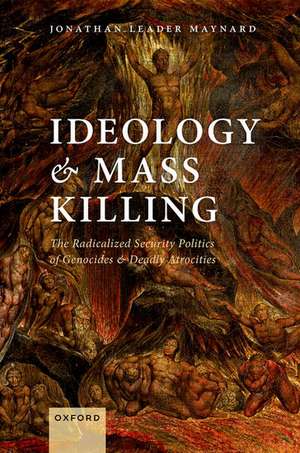Ideology and Mass Killing: The Radicalized Security Politics of Genocides and Deadly Atrocities
Autor Jonathan Leader Maynarden Limba Engleză Hardback – 28 iun 2022
Preț: 705.54 lei
Preț vechi: 1009.81 lei
-30% Nou
Puncte Express: 1058
Preț estimativ în valută:
135.02€ • 146.61$ • 113.42£
135.02€ • 146.61$ • 113.42£
Carte disponibilă
Livrare economică 21-27 martie
Livrare express 18-22 martie pentru 161.66 lei
Preluare comenzi: 021 569.72.76
Specificații
ISBN-13: 9780198776796
ISBN-10: 0198776799
Pagini: 394
Dimensiuni: 162 x 240 x 30 mm
Greutate: 0.79 kg
Editura: OUP OXFORD
Colecția OUP Oxford
Locul publicării:Oxford, United Kingdom
ISBN-10: 0198776799
Pagini: 394
Dimensiuni: 162 x 240 x 30 mm
Greutate: 0.79 kg
Editura: OUP OXFORD
Colecția OUP Oxford
Locul publicării:Oxford, United Kingdom
Recenzii
In explaining why states or armed groups employ extreme violence, Jonathan Leader Maynard questions the sufficiency of dominant rationalist accounts and argues for ideology's central role. He rejects associations of ideology with revolutionary fanaticism, arguing that the key ideological foundations of mass killing are radical reinterpretations of conventional ideas about security. This ambitious and elegantly written book not only offers a fresh conceptualization of ideology, but also demonstrates through careful comparative historical analysis how ideologies shape the goals, organization, and legitimation of mass killing. It is essential reading for all those interested in understanding and preventing atrocity crimes.
In this excellent book, Jonathan Leader Maynard develops a powerful argument about the centrality of ideology to the occurrence of mass killing and genocide. The book takes us farther than previous scholarship in showing how ideology drives the selection and perpetration of mass atrocity. A major contribution to the study of violence, the work should be read widely as a rigorous account of how and why ideas matter in shaping political outcomes
Either dismissed as causally inconsequential or else overstated as the paramount factor, the role of ideology in mass killings has long been a bone of scholarly contention. Jonathan Leader Maynard brings a welcome fresh perspective to this debate and offers a new theory of how and why ideology matters in such violence. We should stop picking sides - strategic security objectives are entirely reconcilable with extremist beliefs. This book explains in legible English the various ways in which ideology operated for the architects and executioners of violence in places as disparate as the Soviet Union, Guatemala, and Rwanda. It will bring much-needed momentum to the debate and move it forward.
Ideology and Mass Killing has a...typical social scientific structure...The writing anticipates questions one imagines the author has received many times and addresses them with genuine intellectual excitement. The text is clearly structured and easy to navigate. Readers with different backgrounds can read chapters in different orders.
The core thrust of Ideology and Mass Killing is that looking at the political ideology of the perpetrators can explain issues of genocide and mass murder. The argument continues that these ideologies provide the distinctive world view necessary for genocide or mass killing to occur. Leader Maynard (King's College London) does well to explain how ideologies work toward the commission of genocide or mass killing...This offers a new take on an important area of exploration for genocide and mass killing scholars.
Leader Maynard's multidisciplinary framework sheds light on the complex processes that leads to mass killing,...it can fill in the gaps of many important tools,...Historians too, will benefit from applying the book's 'ideological infrastructure'.
In this excellent book, Jonathan Leader Maynard develops a powerful argument about the centrality of ideology to the occurrence of mass killing and genocide. The book takes us farther than previous scholarship in showing how ideology drives the selection and perpetration of mass atrocity. A major contribution to the study of violence, the work should be read widely as a rigorous account of how and why ideas matter in shaping political outcomes
Either dismissed as causally inconsequential or else overstated as the paramount factor, the role of ideology in mass killings has long been a bone of scholarly contention. Jonathan Leader Maynard brings a welcome fresh perspective to this debate and offers a new theory of how and why ideology matters in such violence. We should stop picking sides - strategic security objectives are entirely reconcilable with extremist beliefs. This book explains in legible English the various ways in which ideology operated for the architects and executioners of violence in places as disparate as the Soviet Union, Guatemala, and Rwanda. It will bring much-needed momentum to the debate and move it forward.
Ideology and Mass Killing has a...typical social scientific structure...The writing anticipates questions one imagines the author has received many times and addresses them with genuine intellectual excitement. The text is clearly structured and easy to navigate. Readers with different backgrounds can read chapters in different orders.
The core thrust of Ideology and Mass Killing is that looking at the political ideology of the perpetrators can explain issues of genocide and mass murder. The argument continues that these ideologies provide the distinctive world view necessary for genocide or mass killing to occur. Leader Maynard (King's College London) does well to explain how ideologies work toward the commission of genocide or mass killing...This offers a new take on an important area of exploration for genocide and mass killing scholars.
Leader Maynard's multidisciplinary framework sheds light on the complex processes that leads to mass killing,...it can fill in the gaps of many important tools,...Historians too, will benefit from applying the book's 'ideological infrastructure'.
Notă biografică
Jonathan Leader Maynard is a Lecturer in International Politics in the Department of Political Economy at King's College London. He received his doctorate from the University of Oxford in 2014, where he was also the Rank-Manning Junior Research Fellow and then Departmental Lecturer in International Relations at New College between 2013 and 2020. He has published in leading international journals including the Journal of Peace Research, Ethics, the British Journal of Political Science, and Terrorism and Political Violence.
